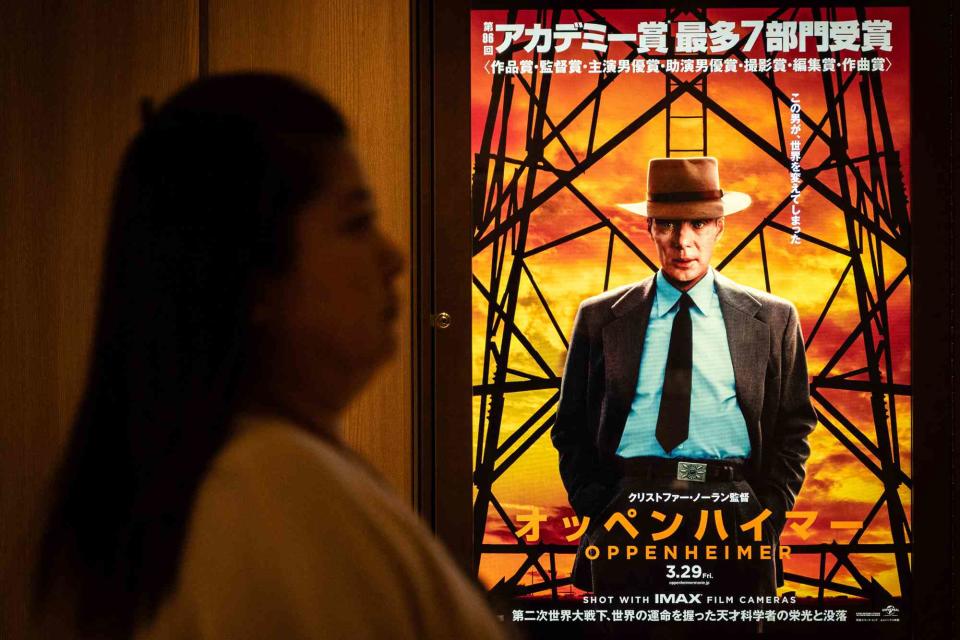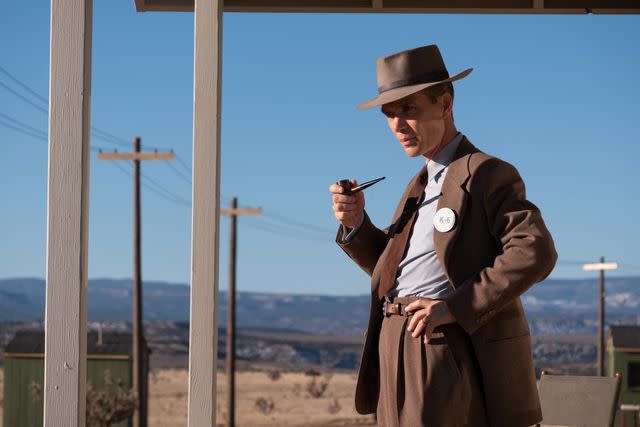“Oppenheimer” Officially Premieres in Japan 8 Months After Release
The Oscar-winning film depicts the development of the atomic bomb and the journey of the man who made it

YUICHI YAMAZAKI/AFP via Getty
Poster for 'Oppenheimer' in Japan on March 29, 2024Moviegoers in Japan are officially able to see Oppenheimer in cinemas — eight months after the movie first premiered elsewhere globally.
On Friday, the Academy Award-winning film starring Cillian Murphy as “father of the atomic bomb” J. Robert Oppenheimer officially premiered in Japan, where Oppenheimer's nuclear weapons led to the destruction of Hiroshima and Nagasaki in 1945.
Several viewers opened up to local media, the Associated Press and The Guardian on Friday, with some detailing their feelings that the "horror of nuclear weapons" wasn't "sufficiently depicted," while others described how it was "right not to broaden it out too much to show the aftermath."
The Christopher Nolan blockbuster, which earned seven Academy Awards at this year's ceremony, was put on hold in Japan by distributors over backlash regarding “Barbenheimer” memes, per the AP. It has since premiered in the country this week, specifically at Hatchoza, a cinema in Hiroshima.
Takashi Hiraoka, former mayor of the city, told The Guardian that the film ultimately could have had "much more description and depiction of the horror of atomic weapons."
“From Hiroshima’s standpoint, there wasn’t enough about the horror of nuclear weapons, but I would encourage people to go and see it," he said.
Related: Christopher Nolan's Oppenheimer Named Best Picture at 2024 Oscars in Impressive Awards Season Sweep

Universal Pictures
Cillian Murphy stars in 2023's 'Oppenheimer'Atomic bomb survivor Prof. Masao Tomonaga told the outlet that he considered Oppenheimer to be an “anti-nuclear” film. “I had thought the film’s lack of images of atomic bomb survivors was a weakness," he said. "But in fact, Oppenheimer’s lines in dozens of scenes showed his shock at the reality of the atomic bombing. That was enough for me.”
The 80-year-old also called the film one for "young people," noting that "it’s now up to future generations to decide how to rid the world of nuclear weapons."
As previously noted, an estimated 140,000 people died by the end of 1945 as a result of Hiroshima's atomic bomb blast on Aug. 6 of that year, while a further estimated 74,000 died in Nagasaki, following the Aug. 9 explosion there.
Never miss a story — sign up for PEOPLE's free daily newsletter to stay up-to-date on the best of what PEOPLE has to offer, from celebrity news to compelling human interest stories.
Hiroshima's Mei Kawashima also told the outlet that the film "triggered something in me" when he heard the name of his city. "This was really a film about Oppenheimer the man, and the way he wrestled with his conscience, so in that sense, I think it was right not to broaden it out too much to show the aftermath.”
Speaking to the AP, Sophia University professor Kazuhiro Maeshima said the movie "shows an America that has changed dramatically," arguing that Oppenheimer's story would not have been told in this capacity decades prior.
Oppenheimer took home Best Picture at the Oscars earlier this month, where it was up against American Fiction, Anatomy of a Fall, Barbie, The Holdovers, Killers of the Flower Moon, Maestro, Past Lives, Poor Things and The Zone of Interest.
Murphy secured the Best Actor trophy, Robert Downey Jr. earned Best Supporting Actor and Nolan won Best Director, among other victories for the blockbuster.
"We made a film about the man who created the atomic bomb. And for better or for worse, we're all living in Oppenheimer's world, so I would really like to dedicate this to the peacemakers everywhere," Murphy said during his acceptance speech.
For more People news, make sure to sign up for our newsletter!
Read the original article on People.


